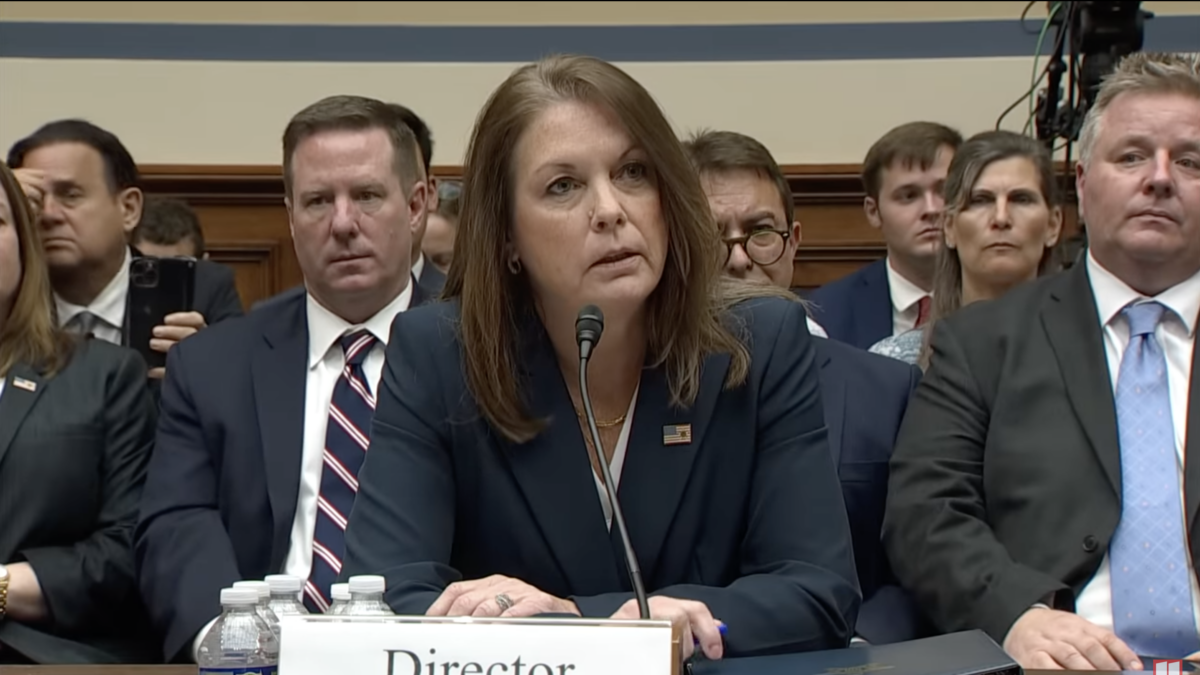
Sen. Rand Paul has walked straight into a bait and switch trap set by big-government proponents like Cass Sunstein. In a recent Time magazine commentary, Paul reacted to the Supreme Court ruling on same-sex marriage by pitching the idea of abolishing state recognition of marriage.
Paul noted that since the ruling may soon lead the state’s police power to intrude into churches and other religious institutions, “perhaps the time has come to examine whether or not governmental recognition of marriage is a good idea for either party.” He suggests that people draw up contracts instead of obtaining state-issued licenses.
Watch your step, Rand! That plan would not at all limit government. It’s central planning in disguise. I know this seems counter-intuitive. After all, libertarians have an old mantra that goes: “Let’s just get the government out of the marriage business!” But that’s an empty slogan. It blindly assumes that government will leave you alone once it no longer has to recognize you and your spouse and potential offspring as bound together as a family unit. These days, nothing can be further from the truth, as I’ll explain below.
Any state contemplating this—such as Alabama and Mississippi—definitely needs to think through the consequences before they decide to stop issuing marriage licenses and replace them with business-style contracts, as Paul prescribes.
Contracts Will End Family Autonomy
Paul should be concerned that his proposal is exactly the same prescription that President Obama’s former regulatory czar Cass Sunstein advanced in his book, “Nudge.” It has also been well-touted by another close friend of the Obama administration: internationally renowned feminist legal theorist Martha Albertson Fineman, who has written at length about replacing state recognition of marriage with contracts as a means to get government into the business of regulating family life and even “all social interactions.”
First, here’s what Sunstein and his co-author Richard Thaler had to say in “Nudge”:
Under our proposal, the word marriage would no longer appear in any laws, and marriage licenses would no longer be offered or recognized by any level of government. . . . Under our approach, the only legal status states would confer on couples would be a civil union, which would be a domestic partnership agreement between any two people.*(*Footnote: We duck the question of whether civil unions can involve more than two people.)
Sunstein and Thaler speciously marketed this idea as something they called “libertarian paternalism,” claiming that it would “privatize marriage.” Sunstein has advocated in more than one place for abolishing civil marriage and replacing it with contracts comprising the negotiated terms of domestic partnerships under the ordinary terms of contract law. In 2008, he also published an article in the Cardozo Law Review, arguing that there is no constitutional right to marry and “states may abolish marriage without offending the Constitution.”
Contracts Would De-Privatize Marriage and Invite Government In
Fineman’s 2004 book, “The Autonomy Myth,” argues strenuously for “the abolition of marriage as a legal category.” I can imagine her cheering Paul’s commentary, because abolishing civil marriage has always been the intent of the elites pushing for same-sex marriage. And why not? It would push the door wide open to central planning.
Paul and Fineman have pretty much the same idea, but their stated intentions are diametrically opposed. Paul claims to be for limited government. Fineman is a long-time friend of both big government and the Obama administration’s collectivist agendas. Fineman advocates for abolishing civil marriage with contracts in order to regulate family relationships. She has thought this through for many years—decades, no doubt—and thought it through deeply. Have Paul and other libertarians given such plans as much thought? I doubt it.
Fineman knows that replacing state-recognized marriage with civil-union contracts across the board will destroy the institutional protection of the family state recognition of the family affords. It would pretty much destroy family autonomy and privacy as we know it. The government would gain great control over personal relationships.
Paul and others who are thinking along his lines are sorely mistaken. Trading in the simple one-page marriage license application for a complex world of contracts with negotiated terms and red tape would definitely not preserve limited government. Just the opposite. A very bad bargain.
Check out what Fineman has to say in her book about using contracts to end family autonomy and privacy. “Contract,” she writes, “is an appealing metaphor with which to consider social and political arrangements. It imagines autonomous adults” hashing out the terms, etc. Yet she envisages that the state will fill the vacuum left by the abolition of family:
. . . in addition to contract rules, I anticipate that ameliorating doctrines would fill the void left by the abolition of this aspect of family law. In fact, it seems apparent to me that a lot more regulation (protection) would occur once interactions between individuals within families were removed from behind the veil of privacy that now shields them.
In addition to “a lot more regulation” occurring, it sounds like removing the “shield” of privacy is a recipe for some state surveillance too.
Abolishing Civil Marriage Gets Government Inside Marriage
Take note, libertarians: central planners like Fineman view state recognition of marriage as the “institutional protection” for family autonomy and privacy which, when removed, would get the government more operational inside the home. In other words, abolishing civil marriage gets government into the marriage business, while state recognition of marriage actually serves as a form of government restraint. So, according to Fineman: “Once the institutional protection [is] removed, behavior would be judged by standards established to regulate interactions among all members of society” (emphasis added).
Standards of behavior would be established by the state, of course. This is unbelievably totalitarian stuff, and we need to wake up to it. So the abolition of state-recognized marriage and its replacement by contracts, according to Fineman, “would mean that sexual affiliates (formerly labeled husband and wife) would be regulated by the terms of their individualized agreements.” The state, of course, has the function of enforcing and regulating contracts.
The utopian vision promoted by Fineman is that families would be defined by the state functionally, as only those “units” involved in caring for children, elderly, or the disabled. In the eyes of the newly empowered state, the couple—or “sexual affiliates”—would be merely two (or more) parties in a contract, isolated individuals in the eyes of the state.
As Fineman notes: “if the family is defined functionally, focused on the caretaker-dependent relationship, the traditionally problematic interactions of sexual affiliates (formerly designated ‘spouses’) are not protected by notions of family privacy.” Apparently, no interaction between spouses or “sexual affiliates” could be protected by “notions of family privacy” in Fineman’s model. She elaborated further and more recently on all of this in an October 2013 article in the Chicago-Kent Law Review.
Thaler and Sunstein argued pretty much in line with Fineman, that people ought use contracts to define the terms of their relationships. Contracts invite—indeed, for Fineman, they demand—that the government function as an intimate partner in this legal ménage a trois.
Please don’t join them, Sen. Paul.
Will We End Spousal Immunity and Invite Parent Licensing?
Paul and other libertarians ought to consider all of the above before promoting a plan that would weaken the family as a buffer zone between individuals and a powerful state. Consider two potential unintended consequences of this plan that would be a central planner’s dream come true: the end of spousal-immunity rights and the licensing of parents.
First, by abolishing state-recognized marriage, we ought to ask: What happens to the current right to refuse to testify against your spouse in a court of law? Well, if we give the state the power to view us all as isolated individuals in law, we remain isolated individuals in the eyes of the law, whether or not we happen to be a party to a domestic partnership contract with someone. We endanger the right to refuse to testify against our spouse.
Second, abolishing civil marriage would hasten the end of the default legal right of parents to raise their own children. Expect to hear more calls for state licensing of parents. I think it’s fair to assess the Supreme Court’s same-sex marriage decision as a declaration that marriage has nothing to do with a connection between any given couple and their biological children. (At least, in its “penumbras.”) This clearly serves to weaken the bond between children and parents in the eyes of the state.
The transgender movement also promotes separation between parents and children by aiming to end all sex distinctions in law. Indeed, we can already see its effects in state refusal to recognize designations of mother, father, son, or daughter on various government forms. Weakening family bonds in the eyes of the state will inevitably lead to more calls to assess parents’ “fitness” and require government license them before they are allowed to raise any children, biological or not. There is a growing drumbeat for this, even, ironically, among some who call themselves libertarian.
I understand why libertarians and others feel that government regulation and interference can be avoided if the government just stops recognizing marriage. Perhaps they even believe this would add a layer of protection for churches and other institutions that uphold one-man-one-woman marriage. Perhaps they think the government would have little to say about the church’s definition of marriage if government simply didn’t recognize marriage at all.
But those are pipe dreams in today’s America. The quandary is deeper than ever because central planners have had this whole scheme laid out for decades—generations, even—while too many family-friendly policymakers have apparently done little to no homework on what’s really at stake. Conservative leaders seem unaware that the real endgame of the same-sex marriage agenda all along has been the abolition of marriage. They’re light years behind.
So Let the Dems Own This One
In Slate the other day, Amanda Marcotte castigated Paul with the headline: “Rand Paul Would Rather End Marriage than Share it With Gay People.” Clearly, Sunstein, Fineman, and sundry Chicago progressive-utopians deserve that accusation far more than Paul does. After all, they’ve laid the groundwork to abolish marriage for decades. They’ve used same-sex marriage as nothing but a vehicle to get there. Now they’ve laid out the bait for libertarians and conservatives to swallow.
Please, Sen. Paul. Please, libertarians: Don’t bite! Don’t become more grist for the Left’s smoke-and-mirrors propaganda machine. All of the central planners tied with the Obama administration would be very happy to have conservatives do their dirty work. (That’s always the way it works, isn’t it?)
Those who have put this scheme together need to be the ones to own it. Let the statists take credit for this mess, including elites in the LGBT lobby, MSNBC, Justice Kennedy, President and Michelle Obama, Facebook, and so on. Let them be the ones to “not share marriage with gay people,” because that was their intention all along. So let them try to finish this thing themselves rather than have people of goodwill swallow it hook, line, and sinker.
For heaven’s sake, Sen. Paul, and anyone else who might walk into this trap: Think this through. Don’t hand them the rope to hang us all.









